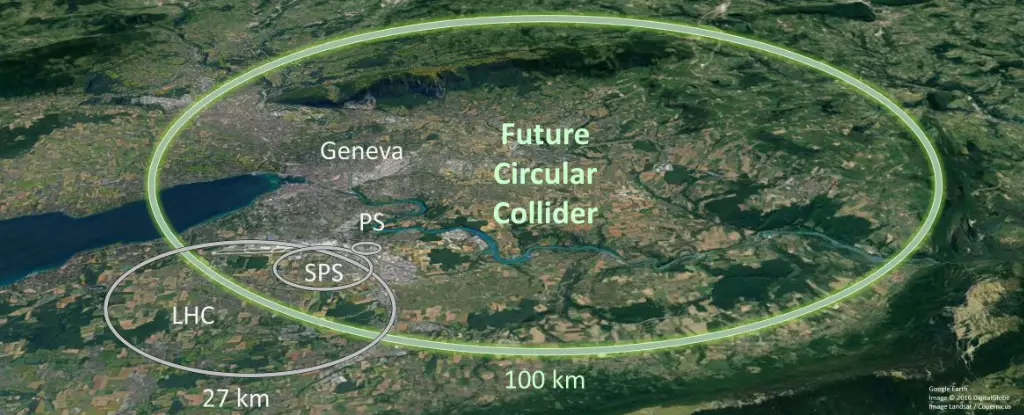Europe stands at a pivotal moment in its scientific journey with CERN’s Future Circular Collider (FCC) project, a venture so extravagantly crafted that it can only be seen as a modern-day testament to human ambition. With a proposed budget of an eye-watering $17 billion, the FCC aims to exceed the capabilities of the already monumental Large Hadron Collider (LHC). However, amid the high hopes of physicists and stakeholders lie nagging doubts about whether this colossal endeavor aligns with the pressing needs of our time.
CERN’s director, Fabiola Gianotti, contends that the FCC is not merely a dream but a necessity for Europe to retain its leadership in the global scientific arena, especially when faced with mounting competition from countries like China. But does scientific ambition justify such exorbitant expenditures, especially when local communities express legitimate concerns about their lands and livelihoods?
Community Concerns: A Clash of Priorities
The voices of residents in areas earmarked for the FCC’s development are starkly contrasted against the lofty rhetoric of scientific progress. Dairy farmer Thierry Perrillat captured the essence of the dilemma when he proposed a scenario reminiscent of David and Goliath: a local farmer versus an international scientific behemoth. For him, the project isn’t an abstract concept; it literally threatens to consume portions of his farm. That individual stories like Perrillat’s should consistently feature in discussions about such mega-projects is a testament to the dissonance between scientific ambition and the on-the-ground realities faced by ordinary people.
The local discontent is echoed in the fears expressed by many community members. When we strip away the technical jargon and grand visions, we are left with the raw concern that lives, not merely livelihoods, are at stake. The FCC could feasibly impact not only local environments but also local economies steeped in tradition and agriculture. The enthusiasm surrounding large-scale scientific projects frequently overshadows these considerations, further exacerbated by the vehemence of scientists arguing for the FCC’s necessity.
The Voice of Dissent: Calls for Redirection
Within the scientific community itself, dissenting voices emerge, urging a reconsideration of available resources. Renowned physicist Olivier Cepas argues for redirecting funding towards smaller, yet equally important scientific ventures. His perspective raises a critical question: should our focus remain fixed on grandiose projects when there exists a plethora of smaller initiatives with the potential for meaningful contribution?
In an age where climate change looms ever larger, the proposed FCC stands accused of adverse ecological impact. Local environmental groups vehemently oppose the project, citing its astronomical energy consumption and potential for irrevocable harm to the planet. When juxtaposed against global crises, the FCC’s mission appears to some as an egregious misallocation of resources better spent elsewhere. It introduces the uncomfortable thought that mere scientific advancement might come at a great environmental and ethical cost—a dilemma that we can scarcely afford to ignore.
A Question of Ethics: Weighing Costs Against Compelling Reasons
Despite claims that up to 80% of the FCC’s financing could be sourced from CERN’s budget, the aesthetic of this ambitious project raises profound ethical dilemmas. Financial support from member states poses additional concerns as nations weigh their local needs against the allure of scientific prestige. A lack of appetite among critical contributors, notably Germany, highlights the contentious nature of this funding venture. While some local officials promote the project as a “win-win” for employment and energy distribution, the ambiguity surrounding the actual benefits versus the potential burdens remains substantial.
It begs the question: should we really be pouring massive resources into a venture steeped in ambiguity, especially when we might not fully grasp its implications? What happens if we invest $17 billion and fail to yield any definitive breakthroughs? The sunk costs, not to mention the scars on local environments, could prove to be a heavy price to pay for an uncertain return on investment.
Contemplating Alternatives: The Road Less Traveled
As discussions surrounding the FCC heat up, the need for a diversified approach to science becomes increasingly apparent. The world’s pressing issues—climate change, healthcare advancements, and educational inequities—begin to feel lost in the echoes of particle physics. Instead of honing in on a singular project that represents astronomic expenditure and limited tangible outcomes, we ought to explore alternate paths that harness creativity and innovation in a broad range of disciplines.
In this context, Europe’s role can shift from being a mere contender in a cosmic chess game to becoming a beacon of comprehensive research that resonates with the needs of its population and the planet. Rather than erecting colossal structures underground, perhaps unearthing the potential of smaller, impactful initiatives could yield results that reflect a more rounded view of progress—one that truly considers the welfare of humanity as its core.


Leave a Reply